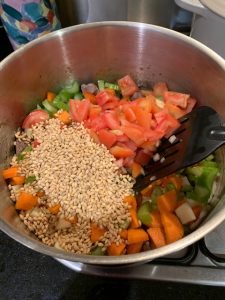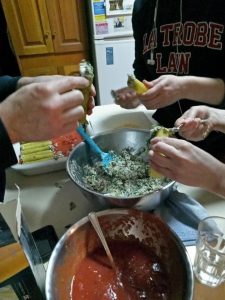Scientists around the globe are searching for a vaccine to cure the world of Covid-19 (Aman & Masood, 2020; Lotfi et al., 2020). Preventative healthy lifestyle measures to boost the immune system are immediately available to everyone, whilst treatment and cure options are found (Aman & Masood, 2020; Arena & Lavie, 2020; Gasmi et al., 2020; Lotfi et al., 2020).
Lockdown can negatively affect a person’s health due to lack of physical activity, increased anxiety, more sedentary behaviours, poor food choices and sleep disturbances (Aman & Masood, 2020; Mattioli et al., 2020; Naja & Hamadeh, 2020).
Being more home based can mean people are sitting or lying down for longer periods effecting their energy needs (Aman & Masood, 2020; Mattioli et al., 2020; Naja & Hamadeh, 2020). Less movement means less food is required for energy (Mattioli et al., 2020).
People with existing chronic illnesses including cardiovascular disease, diabetes, high blood pressure and obesity need to be more vigilant during lockdown to maintain a healthy lifestyle (Arena & Lavie, 2020; Butler & Barrientos, 2020; Mattioli et al., 2020). Catastrophic, high stress events can worsen chronic conditions accelerating the body’s sympathetic response known as fight or flight (Mattioli et al., 2020). When the body is in this heightened state of emergency for too long, greater stress is placed on the body and disease can manifest (Mattioli et al., 2020).
Immune health during lockdown can be strengthened by ensuring a healthy diet (Gasmi et al., 2020; Naja & Hamadeh, 2020; Mattioli et al., 2020). Covid-19 infections cause an inflammatory response in the body (Arena & Lavie, 2020; Butler & Barrientos, 2020; Mattioli et al., 2020). Adequate intake of fresh fruit and vegetables provide antioxidants and vitamins which can combat this (Butler & Barrientos, 2020; Mattioli et al., 2020; Naja & Hamadeh, 2020). Vitamins and minerals are found abundantly in fresh fruit and vegetables, the more varied the better (Mattioli et al., 2020; Yousfi et al., 2020). The immune system is where the human body mounts an attack against infection, and vitamins are essential for it to function correctly (Gombart et al., 2020).
Avoid foods high in sugar as these can increase inflammatory responses in the body (Aman & Masood, 2020; Butler & Barrientos, 2020). Keep saturated fat intake to a minimum and use more mono-unsaturated sources such as extra virgin olive oil (Aman & Masood, 2020; Butler & Barrientos, 2020). Reduce intake of salt (Aman & Masood, 2020; Mattioli et al., 2020). Swap out soft drink for water (Aman & Masood, 2020; Mattioli et al., 2020). Aim to cook meals at home rather than rely on takeaways which are often high in saturated fat and sugar (Yousfi et al., 2020). Low GI foods such as fruit, contain sugars that are slowly released into your system thanks to the fibre component which adds bulk and slows digestion (BDA, The Association of UK Dietitians, 2020). Eating high GI foods like a cake or sugary drink, will flood the body with sugar much quicker (Lennerz & Lennerz, 2018). This can put stress on the pancreas as it releases insulin to combat the high levels of sugar in the blood (Mueller et al., 2010; News in Health, 2017). Once a high GI sugary treat is consumed, there is often a slump as sugar levels drastically drop as the sugar is taken into body cells (Harvard Health Publishing, 2020). This can cause a person to reach for another treat to get ‘another sugar hit’ (Lennerz & Lennerz, 2018). The worst part, all that extra sugar if not needed for energy, is turned to body fat (Karlsen et al., 2016; Ma et al., 2016). This process over time leads to type 2 diabetes and obesity (Diabetes Australia, 2020).
Fresh fruit and vegetables can be expensive when compared to processed food (Butler & Barrientos, 2020; Mattioli et al., 2020). The pandemic has affected the economy (ABC News, 2020). Financial stress may affect someone’s ability to afford a healthier diet (Mattioli et al., 2020). Even making a few changes such as eating a banana rather than a chocolate bar, adding a few more vegetables to your plate daily and going for a few walks each week can improve immune health (Arena & Lavie, 2020). Many people give up if they cannot follow a diet strictly in an all or nothing approach, when just a few small healthy changes can positively impact health (Arena & Lavie, 2020; Butler & Barrientos, 2020).
A varied diet including fresh fruit and vegetables, protein, wholegrains, nuts, and oily fish can provide all the nutrients the body needs (Aman & Masood, 2020; Yousfi et al., 2020). Supplementation is not beneficial except when a person is deficient (Gasmi et al., 2020). A GP will be able to take a blood test to check for any deficiencies (Kljakovic et al., 2012). Multi-vitamins are not recommended for most people who can get all the nutrients they need through their diet (Gasmi et al., 2020). Vegans need to be vigilant to include a nutrient rich diet and may need help from a nutrition expert such as a nutritionist or dietician to ensure intake is adequate and supplementation advice if required (Guo & Katta, 2017).
Elderly people or those in lockdown who are unable to get enough sunlight each day may become deficient in Vitamin D, requiring supplementation (Gasmi et al., 2020; Mattioli et al., 2020; Naja & Hamadeh, 2020). Dietary sources of vitamin D include oily fish, egg yolks and fortified foods such as milk and grains (Yousfi et al., 2020). Low levels of vitamin D can negatively affect immune system health, calcium absorption and has been associated with respiratory illness (Gasmi et al., 2020; Yousfi et al., 2020). People in lockdown should regularly expose themselves to sunlight daily to improve their Vitamin D levels and this can be easily achieved going for a walk during daylight hours (Gasmi et al., 2020).
The burden on worldwide health of chronic diseases is a pandemic itself (Arena & Lavie, 2020; World Economic Forum, 2020). Chronic disease kills millions of people annually (Arena & Lavie, 2020; World Economic Forum, 2020). Whilst these may not be infectious like Covid-19, their existence weakens a person’s immunity and makes people more susceptible to viral infections like Covid-19 with higher infection severity and mortality (Arena & Lavie, 2020; Mattioli et al., 2020; Naja & Hamadeh, 2020). People can control what they eat and how they move to reduce incidence of chronic disease (Arena & Lavie, 2020; Naja & Hamadeh, 2020). These same people may experience fear and anxiety about contracting Covid-19 (Mattioli et al., 2020). Does it not make sense then to take a proactive, responsible approach to prevention of disease?
Are you going to get fit or fat this lockdown? Food for thought.
Helpful websites to obtain information about healthy eating are listed below:
https://www.eatforhealth.gov.au/
https://www.health.gov.au/health-topics/food-and-nutrition
REFERENCES
ABC News. (2020). Australian recession confirmed as COVID-19 triggers biggest economic plunge on record. https://www.abc.net.au/news/2020-09-02/australian-recession-confirmed-as-economy-shrinks-in-june-qtr/12619950
Aman, F. & Masood, S. (2020). How Nutrition can help to fight against COVID-19 Pandemic. Pakistan journal of medical sciences, 36(COVID19-S4): S121-S123. https://doi.org/10.12669/pjms.36.COVID19-S4.2776
Arena, R. & Lavie, C.J. (2020). The global path forward – Healthy Living for Pandemic Event Protection (HL-PIVOT). Progress in Cardiovascular Diseases. https://doi.org/10.1016/j.pcad.2020.05.008
BDA, The Association of UK Dieticians. (2020). Glycaemic Index (GI): Food Fact Sheet, 2020. https://www.bda.uk.com/resource/glycaemic-index.html
Butler, M.J., & Barrientos, R.M. (2020). The impact of nutrition on COVID-19 susceptibility and long-term consequences. Brain Behaviour and Immunity, 87(2020), 53-54. https://doi.org/10.1016/j.bbi.2020.04.040
Diabetes Australia. (2020). About Diabetes, 2020. https://www.diabetesaustralia.com.au/prevention
Gasmi, A., Noor, S., Tippairote, T., Dadar, M., Menzel, A., & Bjørkland, G. (2020). Individual risk management strategy and potential therapeutic options for the COVID-19 pandemic. Clinical Immunology, 215. https://doi.org/10.1016/j.clim.2020.108409
Gombart, A.F., Pierre, A. & Maggini, S. (2020). A Review of Micronutrients and the Immune System-Working in Harmony to Reduce the Risk of Infection. Nutrients, 12(1), 236. https://doi.org/10.3390/nu12010236
Guo, E.L., & Katta, R. (2017). Diet and hair loss: effects of nutrient deficiency and supplement use. Dermatology Practical & Conceptual, 7(1), 1-10. https://doi.org/10.5826/dpc.0701a01
Harvard Health Publishing: Harvard Medical School. (2020). Eating to boost energy, 2020. https://www.health.harvard.edu/healthbeat/eating-to-boost-energy
Kljakovic, M., Davey, C., Sharma, C., & Sharma, D. (2012). Clinical audit of health promotion of vitamin D in one general practice. Asia Pacific family medicine, 11(1), 3. https://doi.org/10.1186/1447-056X-11-3
Lennerz, B. & Lennerz, J.K. (2018). Food Addiction, High-Glycemic-Index Carbohydrates, and Obesity. Clinical Chemistry, 64(1), 64-71. https://doi.org/10.1373/clinchem.2017.273532
Lotfi, M., Hamblin, M.R., & Rezaei, N. (2020). COVID-19: Transmission, prevention, and potential therapeutic opportunities. Clinica Chimica Acta, 508(2020), 254-266. https://doi.org/10.1016/j.cca.2020.05.044
Ma, J., Karlsen, M.C., Chung, M., Jacques, P.F., Saltzman, E., Smith, C.E., Fox, C.S., & McKeown, N.M. (2016). Potential link between excess added sugar intake and ectopic fat: a systemic review of randomized control trials. Nutrition Reviews, 74(1), 18-32. https://doi.org/10.1093/nutrit/nuv047
Mattioli, A.V., Sciomer, S., Cocchi, C., Maffei, S., & Gallina, S. (2020). Quarantine during COVID-19 outbreak: Changes in diet and physical activity increase the risk of cardiovascular disease. Nutrition Metabolism & Cardiovascular Diseases, 30(9), 1409-1417. https://doi.org/10.1016/j.numecd.2020.05.020
Mueller, N.T., Odegaard, A., Anderson, K., Yuan, J., Gross, M., Koh, W., & Pereira, M.A. (2010). Soft Drink and Juice Consumption and Risk of Pancreatic Cancer: The Singapore Chinese Health Study. Cancer epidemiology, biomarkers & prevention: a publication of the American Association of Cancer Research, cosponsored by the American Society of Preventative Oncology, 19(2), 447-455. https://doi.org/10.1158/1055-9965.EPI-09-0862
Naja, F., & Hamadeh, R. (2020). Nutrition amid the COVID-19 pandemic: a multi-level framework for action. European Journal of Clinical Nutrition, 8, 1117. https://doi.org/10.1038/s41430-020-0634-3
News in Health. (2017). The Power of Your Pancreas, 2017. https://newsinhealth.nih.gov/2017/02/power-your-pancreas
World Economic Forum. (2020). This is the biggest challenge to our health, 2017. https://www.weforum.org/agenda/2017/12/healthcare-future-multiple-chronic-disease-ncd/
Yousfi, N., Bragazzi, N.L., Briki, W., Zmijewski, P., & Chamari, K. (2020). The COVID-19 pandemic: how to maintain a healthy immune system during the lockdown – a multidisciplinary approach with special focus on athletes. Biology of Sport, 37(3), 211-216. https://doi.org/10.5114/biolsport.2020.95125


